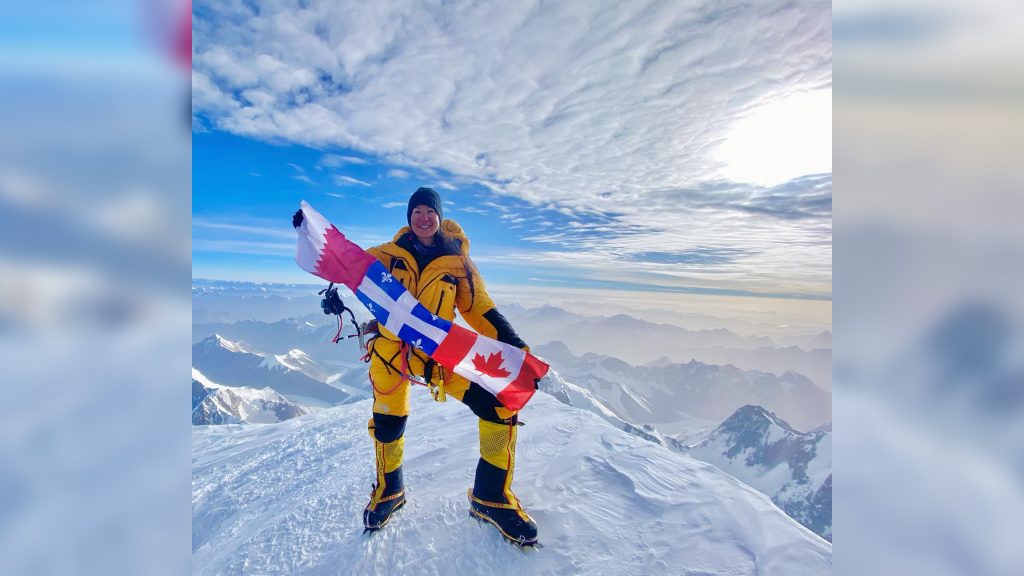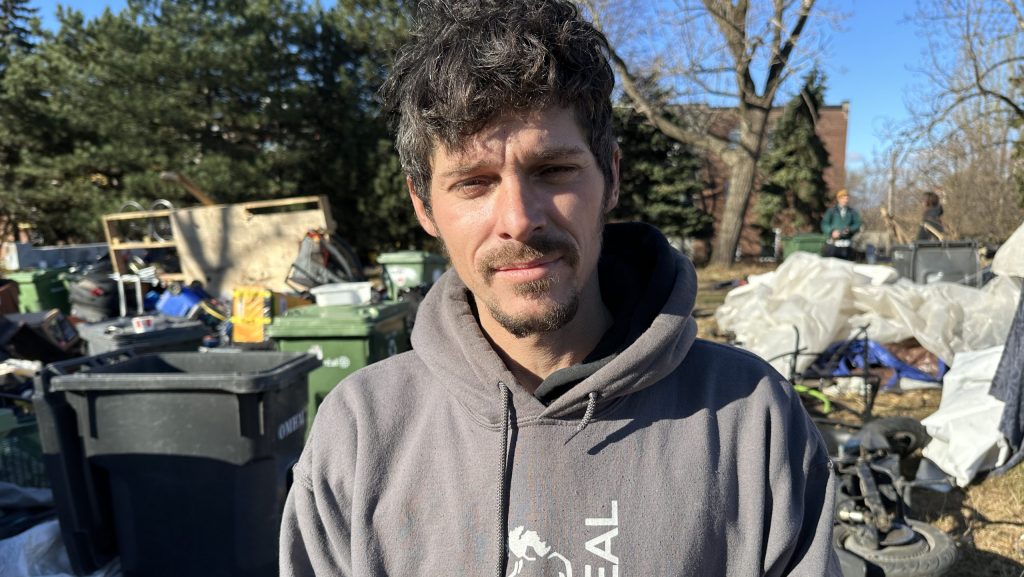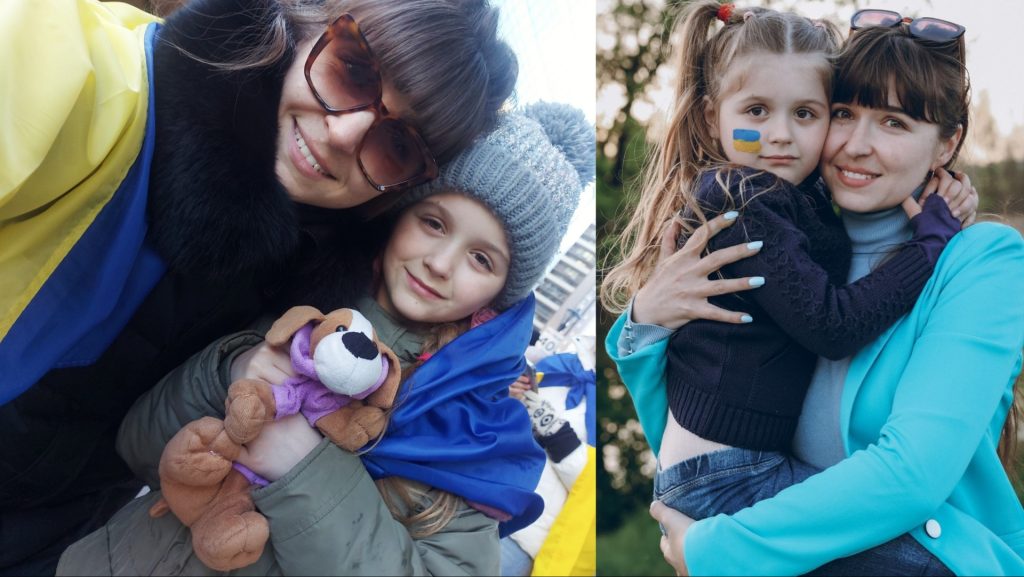Quebec’s Marie-Pier Desharnais among only Canadian women to summit K2

Posted July 30, 2022 2:24 pm.
Last Updated July 31, 2022 12:53 pm.
Marie-Pier Desharnais reached the top of K2 – renowned as one of the toughest mountains on earth – becoming one of the only women in Canada to summit the 8,611-metre monolith on the China-Pakistan border.
The climber from Victoriaville, Que. conquered what’s been dubbed “the King of Mountains” on July 22 at 5:45 a.m. after an ascent of nearly 11 hours from Camp 3.
Back in the valley six days later, Desharnais spoke to The Canadian Press by phone.
“It was a long expedition, but it was a monumental challenge,” the 35-year-old Quebecer said in French from Skardu, Pakistan.
“The ‘summit push’ was a physical challenge. It’s such a steep, calf-burning incline, there are no places to take breaks. Sometimes there’s barely the tip of the crampons that’s hooked and it’s like that for hours and hours.”
Desharnais’s expedition began on June 11, as she worked out administrative details in Pakistan and acclimated herself to the altitude. She completed five days of acclimatization on K2 with a Sherpa before returning to base camp, which sits 5,135 metres above sea level. Then a long wait set in, as she watched for better weather.
A record and a tragedy
Finally, a favorable weather window allowed around a hundred mountaineers to make the ascent on July 22, including Marie-Pier Desharnais with the Elite Exped team. That number marks a single-day record. Since its first ascent in 1954 by the Italians Achille Compagnoni and Lino Lacedelli, fewer than 400 people have reached K2’s peak.
A video shared by Nepalese mountaineer Mingma Sherpa on social media shows a traffic jam that Friday in “the Bottleneck,” a steep section of the ascent that rears up more than 8,200 metres above sea level.
However, those successes were overshadowed a few days later by the death of two mountaineers, Quebecer Richard Cartier and Australian Matt Eakin. The news put Desharnais “in shock,” as she had spent part of the afternoon with Cartier the day before he died, when they were both at Camp 3.
“First, Richard was missing and we were looking for him. We still had hope that he was alive. Then the news came that his body had been found,” she recalled.
The tragedy also served up a grim reminder: “There is no one who is completely safe from danger.”

Desharnais’s expedition began on June 11 before weather allowed her to make the ascent on July 22 up the 8,611-metre monolith on the China-Pakistan border. FACEBOOK/Marie-Pier Desharnais
Beyond the technical skills required to climb K2, Desharnais reckons luck plays a role.
“What was the most difficult or what scared me the most was the descent,” she said. “There are falling rocks all the time because there are other climbers above you who are sending rocks down and you end up below them on a 60-degree slope, so it’s almost vertical.”
Desharnais took a rock to the hand, which she thought was broken, and finished rappelling with her other hand.
“It’s Russian roulette,” she said. “I think that’s why it’s such a tragic mountain. You can manage the risks, do everything you can, have a great team, but there are still some elements that you cannot control.”
K2 is one of the deadliest peaks over 8,000 metres, with a fatality rate of 29 per cent, according to data compiled through 2012 by mountain specialist Eberhard Jurgalski. In contrast, Mount Everest has a four per cent fatality rate, his research found.
In 2018, a K2 expedition made up of Quebecers took a tragic turn with the death of mountaineer Serge Dessureault.
Inspirations
Marie-Pier Desharnais was part of a team led by seasoned mountaineer Nirmal “Nims” Purja, made famous by the film “14 Peaks: Nothing Is Impossible,” where he recounts his ascent within seven months of the world’s 14 mountains that boast peaks above 8,000 metres.
“I knew Nims, who is my mentor, before he was famous during his project. He had three mountains left,” she said. “We became friends and I started doing technical mountains with him, including Ama Dablam, in Nepal.”
Desharnais believes her life changed at that moment, when she began to consider climbing K2, which she’d previously deemed out of reach.
“Nims manages to see things in you, he manages to make you realize your full potential,” she said. “Once you get that, it not only affects the mountains but the rest of your life as well.”
Desharnais, who survived a tsunami in Thailand in 2004, also found inspiration in disaster management. She stresses that the courses of one of her geography professors at the Universite du Quebec a Montreal, Sylvain Lefebvre, helped her find meaning and drive.

Hands reach for Marie-Pier Desharnais as she gets a hug on her arrival in Montreal on Wednesday, 29 December, 2004, from Thailand, where she survived the tsunami disaster. (CP PHOTO/Ian Barrett)
“A theme that is very present in my life is resilience: personal, organizational in my work, and obviously I use it in the mountains more than ever,” said Desharnais, who works as a disaster management expert in Qatar.
With 10 years spent in the Middle East in a profession composed mainly of men, along with her passion for mountaineering – a very masculine milieu – the theme of women has taken an important place in her life, she says.
“My current project – the Apex Woman Project – is to climb five of the highest and most difficult mountains on the planet where, precisely, there have not been many women,” she explained. “I want it to elevate the feminine footprint to those heights.”
After seven years in mountaineering, she has seen changes. Her recent K2 expedition was the first she took part in where women outnumbered men.
“Just because you’re a woman doesn’t mean things have to be out of reach,” she says.
Correction: The Canadian Press erroneously reported that Marie-Pier Desharnais was the first Canadian woman to reach the summit of K2. In fact, Sophie Lavaud, an aplinist holding Swiss, French and Canadian citizenship, reached it in 2018.








